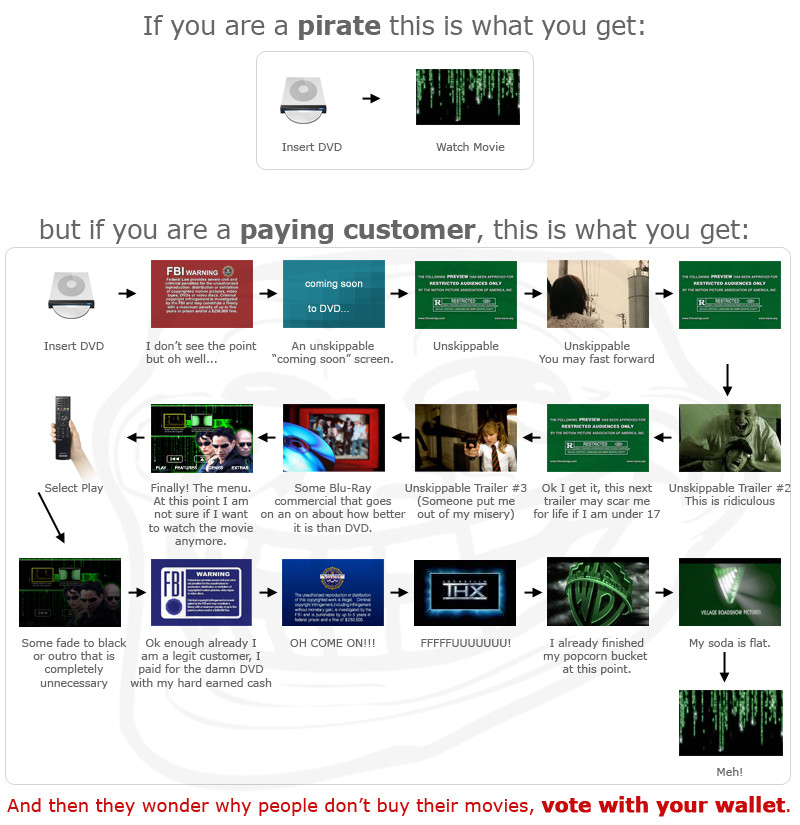Digital Rights Management. You may not know this term, but I bet you’ve experienced it. DRM is the technology that prevents you from playing your iTunes movie on your XBox 360, or it prevents you from reading your Kindle eBook on your Nook. I’m going to discuss my thoughts on DRM.
First, I think we should come up with an easy to understand definition of what DRM is. Digital Rights Management (or DRM) is defined as a technology that implements access control over digital media. This technology uses encryption to prevent a user from playing the media on devices that are deemed by the content rights holder to be unauthorized.
Here’s An Example:
A current example would be found in Apple’s iTunes software. If you head into iTunes, and purchase a digital copy of a movie, then you download that movie. You supposedly own this particular copy of this movie. This movie however comes bundled with a DRM technology called FairPlay. (I find nothing “fair” about it) FairPlay will prevent this movie from playing on any device that your Apple ID is not signed in to. (This is why you can only have a certain number of devices on your Apple ID) So since you can’t sign onto an XBox 360 with an Apple ID, you cannot use your XBox to watch the movie on your TV. That means you’d have to connect an authorized Apple device to your TV. If you don’t have one that connects to a TV, then you have to go out and buy one, or deal with watching the movie on your iPhone or computer. That’s ridiculous! It’s also not Apple’s fault. The companies that own the rights to your purchased movie are forcing Apple to inflict this DRM upon you, or they won’t give Apple the right to sell it to you. This is just one example. Amazon, ZunePass, and countless other sources all use DRM. While Apple doesn’t use it on music anymore (after fighting a long uphill battle on behalf of their customers) they are still being forced to use it on TV shows, books, and movies.
So why does DRM exist?
DRM exists to stop piracy. Yes, I know it doesn’t work, and you know it doesn’t work. I have a feeling that RIAA (Recording Industry Association of America) and MPAA (Motion Picture Association of America) both know it doesn’t work either. Why they still make us put up with it is easy to guess though. They are greedy. RIAA, and MPAA would rather sue someone, or have someone criminally charged for hacking their DRM to get his XBox to play his iTunes movie, then to let him just play the movie he purchased, wherever, and however he wants. On paper, DRM sounds like a great way to stop piracy. In reality though it is pretty much worthless. If you check out any of the usual piracy1 websites (I will not provide links, but Google is your friend) then you will see that there are plenty of movies, tv shows, music, and games/software all without their copy protection. These are not DRM free copies by nature. It was removed by hackers to allow others to enjoy them. Sometimes it takes less than a day to hack a new DRM system. So RIAA and MPAA, and the rights holders spend months, or years designing these systems, and they get defeated in a day by some hacker with a day to waste. Apple’s FairPlay has been repaired, and cracked many times. A tool called Requiem has been released that removes the FairPlay from your purchases. It’s not meant for piracy, and it leaves your Apple ID in the file. If you share your De-DRMed files, you will get caught. You can however use them yourself however you want now thanks to Requiem. (Again, no links from me. Sorry, but the law is on the bad guy’s side in this)
The Worst Kind Of DRM:
Now I’m going to discuss the worst kind of DRM, and the reason I decided to post this blog entry today. Recently a new game came out that I really wanted to buy. This game is called Diablo 3. You may have heard of it. It’s the long awaited sequel to Diablo 2. Blizzard is the gaming company that makes it. What does Diablo 3 have to do with a rant on DRM? I’ll tell you. Diablo 3 has something called an “Always on DRM.” This means that when I install Diablo 3 on my computer, and I try to sign in to play multiplayer, Diablo 3 has to be connected to the internet. (Duh!) The part that angers me, is that Diablo 3’s DRM goes through Blizzard’s central server system called Battle.NET. So if I want to play Diablo 3 single player mode just so I can play through the story, I shouldn’t need the internet right? I mean this game does take up a large amount of space on my computer. What can it possibly need from the internet to let me play? Always on DRM forces you to be connected to the internet to use the game at all. If I want to play single player, I have to be signed in to Battle.NET. This doesn’t sound so bad at first right? Well think about this. The night Diablo 3 came out, Battle.NET got overloaded, and the servers went down. Everyone who was playing multiplayer couldn’t play, (obviously!) but everyone playing single player also got a nasty surprise! They were kicked out of their solo adventure and given an error that the connection was lost. There are a few things wrong with this. Not everyone has high speed internet yet. (I know it sounds weird, but it’s true) Some people may want to play the game while they are not near an internet connection, others may want to play while their internet is down. If your neighbor’s landscaper accidentally cuts the line in the street to your ISP, you get kicked out of your game, and will lose any progress since you last saved. You also can’t play again until your ISP makes their way out to your house to find, and fix the issue. The worst part is yet to come. What if Blizzard goes out of business? Then every game that you paid money for and supposedly own forever that has Always on DRM can no longer be played ever again! You can’t even get a refund from Blizzard since they are out of business. You can’t return it to your local retailer, since they are not responsible for this. You are now out of all these games. This is DRM at its worst. The scary part is that this is becoming more, and more common too. This has to be stopped. I refuse to buy Diablo 3 because I won’t support anything with Always on DRM. I urge you to do the same. Yes, I will be missing out on the rest of the Diablo series story, but that is Blizzard’s fault. (Not like they care about their customers) I’m sure in a few weeks, to a few months at most, someone will crack the Always on DRM, and you’ll be able to fake the Battle.NET connection. Then you can play single player without needing to connect to Blizzard. That’s right, in order to enjoy a game you paid for without the risk of losing progress due to a disconnection, you will have to break the law by cracking the DRM on it, and “pirating” it.
The Solution:
The solution to this problem is much simpler than you think. DRM exists to stop piracy, but people go out and pirate things now to avoid DRM. It is a cure worse than the disease. Think about it. When you buy a DVD, and you try to watch it, what happens. You sit through unskippable warnings, and unskippable commercials/trailers. That’s ridiculous. Commercials exist to monetize something that you aren’t paying for. That way it can be provided to you at no cost. (Just like a website that is free to use, but has ads on it) I remember paying for this DVD, why should I be forced to watch anti-piracy warnings, and commercials? Any modern DVD will waste a good 5-10 minutes of your time before you can finally enjoy your movie. Now what happens if you buy a bootleg DVD, or you pirate a movie, and burn it to DVD yourself? You pop the DVD in, and enjoy it. Here’s a good diagram of the purchased vs pirated DVD breakdown:

As you can see, all of this DRM, and anti-piracy stuff doesn’t stop piracy, but it takes away from the experience of the legitimate buyer. Piracy however is not the answer, as the RIAA, MPAA, and rights holders only make things worse when you pirate. The answer is to just send them letters telling them you won’t spend a dime on anything riddled with warnings, commercials, DRM, or FBI threats. Tell them you will only consume free media from independent film makers, and independent musicians until they get their act together. I’ve yet to see any independent anything harass people with DRM. They know that DRM hurts their sales, but unlike the big players, they can’t afford it. Not only will you hurt DRM, and help change the industry, but you’ll be helping out regular people by buying their stuff. You can also find plenty of amazing games made by independent game studios that are willing to sell their games DRM free.
DRM Free Sources:
Here are a few links to some sources to obtain legal DRM free media. (I just did some quick Google searches, so it shouldn’t be too hard to find more.)
Music:
iTunes (All iTunes music is DRM free now. Video downloads are still “infected” with DRM)
Amazon MP3
Video:
Sadly I couldn’t find any sources for DRM free movies. I recommend just using Netflix. It does have DRM in it, but it only uses it to prevent you from keeping the Netflix rentals forever. (Which is the ONLY valid reason for DRM)
Games:
gog.com
Humble Bundle (Only around sometimes, but you pay what you want for them, and the money helps support the EFF’s fight against DRM in the courts)
-
I am against piracy, so I won’t provide any links to piracy sources. ↩

